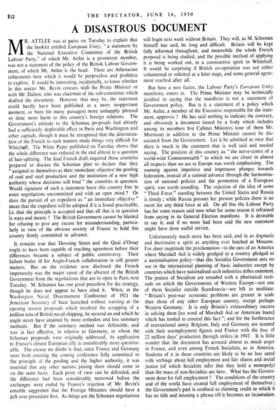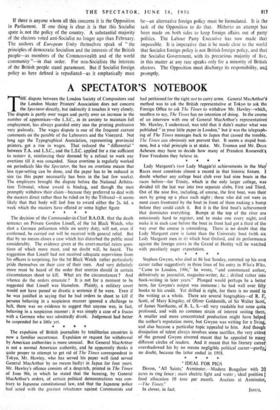A DISASTROUS DOCUMENT
PtA MR. ATTLEE was at pains on Tuesday to explain that the booklet entitled European Unity," a statement by the National Executive Committee of the British Labour Party," of which Mr. Attlee is a prominent member, was not a statement of the policy of the British Labour Govern- ment, of which Mr. Attlee is the head. There are Athenasian refinements here which it would be purposeless and profitless to explore. It would be interesting, incidentally, to know whether in this matter Mr. Bevin concurs *a, the. Prime Minister or with Mr. Dalton, who was chairman of the sub-committee which drafted the document. However that may be, the statement could hardly have been published at a more inopportune moment, or been (in many passages) more unhappily phrased or done more harm to this country's foreign relations. The Government's attitude to the Schuman proposals had already had a sufficiently deplorable effect in Paris and Washington and other capitals, though it must be recognised that the determina- tion of the French to rush matters made things very difficult for Whitehall. The White Paper published on Tuesday shows that the whole difference was reduced in the end almost to a question of hair-splitting. The final French draft, required those countries prepared to discuss the Schuman plan to declare that they " assigned to themselves as their immediate objective the pooling of coal and steel production and the institution of a new high authority whose decisions will bind " the countries in question. Would signature of such a statement leave this country free to enter negotiations uncommitted and with an open mind ? Or does the pursuit of an expedient as " an immediate objective " wan that the expedient will be adopted if it is found practicable, 'i.e. that the principle is accepted and that all that is in question its ways and means ? The British Government cannot be blamed for refusing to give any excuse for misunderstanding, particu- larly in view of the obvious anxiety of France to hold this country firmly committed in advance.
It remains true that Downing Street and the Quai d'Orsay ought to have been capable of reaching agreement before their differences became a subject of public controversy. Their failure bodes ill for Anglo-French collaboration in still greater matters. But on the evidence now disclosed the French impetuosity was the major cause of the absence of the British Government from the negotiations that are to open in Paris next Tuesday. M. Schuman has one good precedent for his strategy, though he does not appear to have cited it. When, at the Washington Naval Disarmament Conference of 1921 the merican Secretary of State launched without warning at the opening session proposals which involved the scrapping of a million tons of British naval shipping, he secured an end which he might never have attained by more orthodox and less summary methods. But if the summary method was defensible, and was in fact effective, in relation to Germany, to whom the Schuman proposals were originally addressed, its application to France's closest European ally is considerably more question- able. The excuse no doubt is that, since France and Germany were both entering the coming conference fully committed to the principle of the pooling and the higher authority, it was essential that any other nations, joining them should come in on the same basis. Each point of view can be defended, and the difference had been considerably narrowed before the exchanges were ended by France's rejection of Mr. Bevin's sensible suggestion* that the Foreign Ministers should have a talk over procedure first. As things are the Schuman negotiations will begin next week without Britain. They will, as M. Schuman himself has said, be long and difficult. Britain will be kept fully informed throughout, and meanwhile the whole French proposal is being studied, and the possible method of applying it is being worked out, in a constructive spirit in Whitehall. It would be surprising if British co-operation was not either volunteered or solicited at a later stage, and some general agree- ment reached after all.
But here a new factor, the Labour Party's European Unity manifesto, enters in. The Prime Minister may be technically justified in saying that the manifesto is not a statement of Government policy. But is it a statement of a policy which Mr. Attlee, a member of the Executive responsible for the state- ment, approves.? He has said nothing to indicate the contrary, and obviously a document issued by a body which includes among its members five Cabinet Ministers (one of them Mr. Morrison) in addition Ito the Prime Minister cannot be dis- sociated from the Government. Let it be admitted at once that there is much in the statement that is well said and needed saying. The position o this country as " the nerve-centre of a world-wide Commonwealth " to which we are closer in almost all respects than we are to Europe was worth emphasising. The warning against impulsive and impetuous plunges towards federation, instead of a rational advance through tile harmonisa- tion of national policies and the promotion of a European spirit, was worth sounding. The rejection of the idea of some " Third Force " standing between the United States and Russia" is timely ; while Russia pursues her present policies there is no room for any third force at all. On all this the Labour Party has for some reason said now what for some reason it refrained from saying in its General Election manifesto. It is desirable to say it, and if no more had been said the new statement might have done useful service.
Unfortunately much more has been said, and in as dogmatic and doctrinaire a spirit as anything ever hatched at Moscow. For sheer ineptitude the proclamation—in the ears of an America where Marshall Aid is widely grudged to a country pledged to a nationalisation policy—that this Socialist Government sees no use in the international planning of basic industries except by countries which have nationalised such industries defies comment. The praises of Socialism are sounded with a pharisaical recti- tude on which the Governments of Western Europe—not one of them Socialist outside Scandinavia—are left to meditate. " Britain's post-war economic problems are greater in scale than those of any other European country, except perhaps Western Germany. It is only Britain's extraordinary success in solving them [no word of Marshall Aid or American loans] which has tended to conceal this fact "; and for the furtherance of international amity Belgium, Italy and Germany are taunted with their unemployment figures and France with the loss of 22 million days' production through strikes in 1947. It is little wonder that the document has aroused almost as much anger in France, and even among French Socialists, as in America. Students of it in those countries are likely to be no less sated with verbiage about full employment and fair shares and social justice (of which Socialists infer that they hold a monopoly) than the mass of non-Socialists are here. What has the Govern- ment done for full employment ? The conditions of the country and of the world have created full employment of themselves ; the Government's part is confined to claiming credit to which it has no title and intoning a phrase till it becomes an incantation. If there is anyone whom all this concerns it is the Opposition in Parliament. If one thing is clear -it is that this Socialist spate is.not the policy of the country. A substantial majority of the electors voted anti-Socialist no longer ago than February. The authors of European Unity theMselves speak of " the principles of democratic Socialism and the interests of the British people—as members of the Commonwealth and of the world community "—in that order. For non-Socialists the interests of the British people stand paramount. But if Socialist foreign policy as here defined is repudiated—as it emphatically must be—an alternative foreign policy must be formulated. It is the task of the Opposition .to do that. Hitherto an attempt has been made on both sides to keep foreign affairs out of party politics. The Labour Party Executive has now made that impossible. It is imperative that it be made clear to the world that Socialist foreign policy is not British foreign policy, and that the Socialist Government, with its precarious majority of five, in this matter at any rate speaks only for a minority of British electors. The Opposition must discharge its responsibility, and promptly.





































 Previous page
Previous page